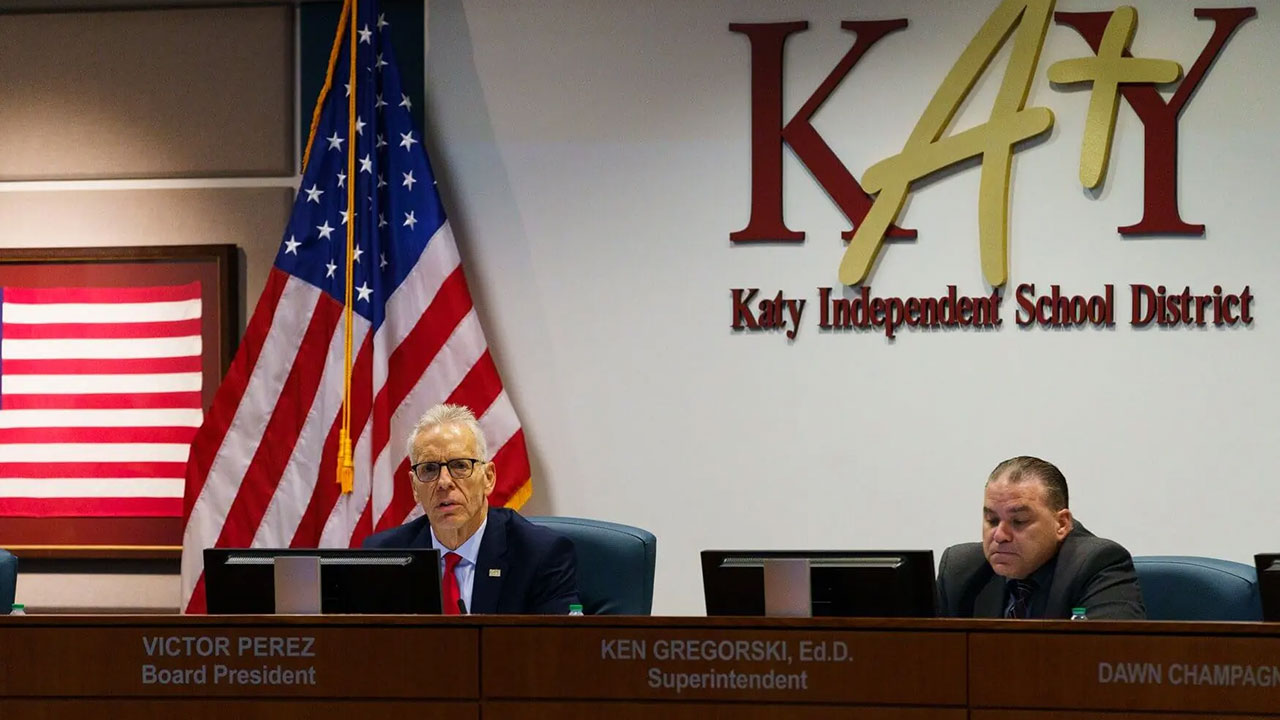Texas
Texas health providers are suspending gender-affirming care for teens in response to GOP efforts
Hospitals across the state have already started restricting critical treatment as health care providers fear legal consequences and worry they could lose their medical licenses. Meanwhile, teenagers are already leaving the state to get care or avoiding medical care altogether.

This article originally appeared in The Texas Tribune
 Jennifer’s 15-year-old son had been on testosterone therapy for only two weeks when she got a call from his doctor. The exchange felt “very clandestine,” she said.
Jennifer’s 15-year-old son had been on testosterone therapy for only two weeks when she got a call from his doctor. The exchange felt “very clandestine,” she said.
“He calls from his personal number, calls my personal number [and] doesn’t use my child’s name because he’s scared somebody is recording the conversation,” Jennifer said.
The doctor told her he could no longer prescribe her son’s treatment. The medical malpractice insurance carrier, he explained, had stopped covering doctors who offered hormone therapy to minors.
The doctor’s call came a week after Gov. Greg Abbott ordered investigations into parents and licensed facilities that provide standard medical care to transgender teenagers. Abbott’s order was based on a nonbinding interpretation from Attorney General Ken Paxton that classified puberty blockers, hormone therapy and surgical care as child abuse.
Jennifer asked The Texas Tribune not to disclose her last name because she fears the state could launch an investigation into her family for obtaining hormone therapy.
Leading medical organizations across the country say gender-affirming care is the best way to provide care for transgender children. It primarily involves choices around name, pronouns and clothing that align with a child’s gender identity. It can eventually include puberty blockers and hormone treatment. Surgical care is rarely, if ever, performed on teenagers.
On Monday, a state appeals court reinstated a lower court’s injunction temporarily halting the investigation of transgender kids’ parents and medical providers. The court says the injunction will remain in place while an appeal of the decision plays out.
But in response to the Texas GOP’s recent efforts to limit scientifically backed gender-affirming care, LGBTQ advocates say hospitals, insurance companies and pharmacies across the state had already started restricting critical treatment for fear of legal consequences.
Health care providers worry they could lose their medical licenses if they don’t abide by Abbott’s directive.
U.S. Surgeon General Vivek Murthy told the Tribune that Abbott’s directive has had a chilling effect on health care practitioners, hospital systems and clinics.
“What’s happening right now is the state inserting itself between doctors, patients and families,” Murthy said. “That runs counter to the integrity of the doctor-patient relationship.”
Transgender teenagers now are grappling with narrowing access to medical care in a state where adequate, inclusive health care is already hard to come by. The lack of access has driven some to secure a substandard quality of care and others to stop seeking care altogether.
Jennifer said the doctor’s decision to stop hormone therapy was devastating for her family. She had searched for months for a pediatrician who would use her son’s correct pronouns and respect his identity. She had combed through parent Facebook groups and left voicemails with multiple health care centers before she met the doctor who started his treatment. Now she’s back at square one.
“You can’t find this care easily. Everyone is taking it off their website,” Jennifer said. “It’s like you got to know a secret handshake and then the secret knock and then the right phone number. It’s ridiculous what you have to go through to get your kid life-saving medical care.”
Providers roll back treatment
Teens who get approved for hormone therapy do so with great medical oversight. But before getting to that point, the standard approach to care for transgender youth begins with counseling and mental health evaluations.
Mental health professionals first help transgender clients navigate their gender identity. They can diagnose transgender clients with gender dysphoria by following a diagnosis tool published by the American Psychiatric Association. Therapists may later refer clients to doctors for hormone therapy and puberty blockers, and those doctors would complete a separate evaluation before prescribing medication. It’s a process that can span years.
The state’s largest providers of medical care for transgender children, however, have recently rolled back those services, bending to pressure from Republican leaders.
Texas Children’s Hospital, the largest pediatric hospital in the country, stopped providing hormone therapy to transgender children earlier this month. A spokesperson said the Houston-based hospital was assessing Abbott’s directive and that the decision to discontinue the service was made to avoid “potential criminal ramifications.”
Legacy Community Center, another major provider in Houston for transgender children, also paused hormone therapy for minors after the directive was announced, according to advocates for transgender Texans who work closely with the clinic. Legacy did not respond to multiple requests for comment.
And in Dallas, GENECIS — Gender Education and Care, Interdisciplinary Support — the state’s largest gender-affirming program, formally dissolved in November. The closure was in response to pressure from the governor’s office and a Texas House investigative committee, according to recordings of internal meetings obtained by The 19th. Existing patients can continue hormone therapy, but new patients at GENECIS can only access psychiatric evaluations and counseling, and be evaluated for gender dysphoria.
A doctor who headed the GENECIS program recently filed a petition against her employer, UT Southwestern Medical Center, to find out why the hospital cut care.
Gender-affirming medical and mental health care has always been in short supply in Texas, even before the GOP started targeting transgender children. So when the three major providers of gender-affirming care decided to halt their services, it was a huge blow for transgender Texans already struggling to find treatment, said Austin-based psychotherapist Monrovia Van Hoose, who often works with transgender youth.
The recent anti-trans efforts are “a backlash against what I would call pretty modest gains in access to care for minors in Texas,” she said. “I was very saddened to hear that GENECIS closed down. That was a big deal when that facility opened.”
Van Hoose said few doctors were willing to offer gender-affirming care in the state when she started working with transgender teenagers in 2008. More began to offer treatment after the GENECIS clinic opened in 2014.
But beyond GENECIS, Texas Children’s and Legacy, doctors who offer gender-affirming are still few and far between. Lou Weaver, a 51-year-old transgender man who works with health care providers to secure culturally competent care for LGBTQ communities, said Texas medical schools are not offering enough training on how to treat transgender patients, which means most local pediatricians are unable to provide appropriate care for transgender children.
Families often have to make hourslong drives to get medically backed gender-affirming care for their children. One family in the Rio Grande Valley told the Tribune they drive eight hours to Dallas to get care for their child.
But now even those long drives might not be enough to access care as doctors weigh new legal liabilities. When Paxton said gender-affirming care can be considered child abuse, it put health care professionals in a tight spot because they are mandated to report child abuse.
Therapists, pediatricians and doctors could now lose their licenses if they don’t report the families of their transgender clients. Making such reports, however, would violate standards of care from health organizations such as the World Professional Association of Trans Health and the American Medical Association.
Areana Quiñones, executive director of Texas-based Doctors for Change, said health care providers are disappointed legal and political issues are getting in the way of providing science-based medical treatments.
“We’re put in a no-win situation no matter what we do,” said Renee Baker, a Dallas-based therapist. “We don’t want to lose our licenses and ability to practice.”
Weaver said the hospitals could have used their teams of lawyers to advocate for scientifically backed medical treatments, “and yet they’re caving.” Health care providers are failing to protect their patients when they pull back treatment in response to political pressure, he said.
Few good choices left
Weaver said many transgender teenagers in Texas, facing diminishing options for care, will turn to informal channels to get the puberty blockers and hormone prescriptions they need. Some could try to buy prescriptions off of friends or look to the state’s unregulated black market, he said.
“What are you going to do to get what they need? You find a way to get it,” he said. “Our leaders have made this a desperate time for people who need access to health care.”
One teacher said in a written testimony at a Texas Department of Family and Protective Services meeting this month that some of her transgender students have rationed their hormone prescriptions over weeks because of inadequate access to medical care.
Some parents are traveling beyond Texas to get access to gender-affirming medical treatment. Some may also travel out of state to get any kind of medical care out of fear that going to a Texas health provider may require disclosing gender-affirming therapy and lead to a child abuse investigation.
Carrie Jackson drove her 17-year-old transgender son to Oklahoma to get emergency mental health care one week after Abbott issued his directive. Her son woke her up in the middle of the night because he was preparing to attempt suicide. Her son told her Abbott’s directive had made him feel like his existence was creating a threat for his family, she said.
Carrie Jackson stayed up with him through the night and scheduled multiple virtual assessments the following morning. Medical providers told her he needed to be admitted to a hospital.
She wanted to get him help as soon as possible, but she held back from taking him to a local hospital because she was afraid that DFPS, the state child welfare agency, would learn about the gender-affirming care her son has received and open an investigation.
“I don’t want my child in a hospital being interrogated by [DFPS] and without me being able to have any access to him to be there as a support for him,” she said.
Carrie Jackson did some research and found a mental health facility in Oklahoma, about three and a half hours away from their Denton home. Her son was admitted for six days and is stable now.
Some families that cannot leave the state have avoided seeking care altogether.
Jackson, a 15-year-old transgender teenager in North Texas, was supposed to increase his testosterone dosage six months ago. Jackson is not related to Carrie Jackson and did not disclose his last name out of fear that his family would be reported to the state for child abuse over his medical treatment.
He has been a GENECIS patient for two years, but since the clinic formally dissolved, he’s experienced additional barriers to obtain routine medical treatment. Increasing his prescription dosage used to entail a single appointment with his doctor at GENECIS and bloodwork, but he now has to meet with three doctors at three clinics.
What’s more, he and his family are terrified to book an appointment while Abbott’s directive is still being litigated. If DFPS gets a report about his medical care, Jackson might have to stop taking testosterone until his 18th birthday.
Greater risks with delayed care
But Jackson can’t wait another three years for hormone therapy. Gender dysphoria, he said, was an intolerable sense of discomfort that pervaded every part of his life. Since he started testosterone, he has experienced an increasing sense of comfort with his body.
“To be taken off of the one thing that has really changed my life for the better so far — it’s terrible,” Jackson said.
Waiting until adulthood to get hormone therapy may put transgender patients at greater mental health risk. A recent study found that access to gender-affirming hormone therapy in adolescence is associated with better mental health outcomes later in life.
If access to hormones like estrogen and testosterone is disrupted, transgender youth may undergo unwanted puberty changes and experience bodily functions like menstrual bleeding that can be distressing, according to Caroline Davidge-Pitts, an endocrinologist who specializes in trans health care.
When transgender youth experience unwanted changes to their bodies that do not affirm their gender identity, endocrinologists say it will likely lead to more surgeries later in life that otherwise could have been avoided. If a transgender boy, for example, experiences breast growth because he lost access to puberty blockers, he would need chest surgery later, said Joshua D. Safer, an endocrinologist and executive director of the Mount Sinai Center for Transgender Medicine and Surgery in New York.
“The point of puberty-delaying medication and hormone therapy for transgender youth when possible is to avoid permanent characteristics that will have to be addressed later,” Safer said.
Kamryn Shelton, a transgender 19-year-old, said his younger peers have attempted suicide when they have not been able to access the medical care they need.
Shelton, who supports teenagers in the Dallas-Fort Worth area through the organization Youth First, worries about youth who become disconnected from their hormone therapy or can no longer get an appointment with a gender-affirming doctor.
“Their mental health will rapidly decline. And if you stop taking your hormone shots or hormone blockers, it’s not only going to mess you up mentally, it’s going to mess with you physically as well.” Shelton said. “It’s going to kill people. If it goes any further, it will literally kill children. And that’s terrifying to me.”
Disclosure: Facebook and UT Southwestern Medical Center have been financial supporters of The Texas Tribune, a nonprofit, nonpartisan news organization that is funded in part by donations from members, foundations and corporate sponsors. Financial supporters play no role in the Tribune’s journalism. Find a complete list of them here.
The Texas Tribune is a nonpartisan, nonprofit media organization that informs Texans — and engages with them – about public policy, politics, government and statewide issues.
Education
Feds investigate another Texas school district for its gender identity mandate
Katy ISD’s board voted this past fall to require staff to notify parents if their child wants to use a different pronoun or identifies as a different gender.

This article originally appeared in The Texas Tribune
 The U.S. Department of Education’s Office for Civil Rights opened an investigation Monday into Katy Independent School District’s gender identity policy on the basis of gender harassment under Title IX. The investigation came nine months after the Houston Landing reported that the district adopted a policy that notifies parents if their child requests to use a different name or pronouns at school.
The U.S. Department of Education’s Office for Civil Rights opened an investigation Monday into Katy Independent School District’s gender identity policy on the basis of gender harassment under Title IX. The investigation came nine months after the Houston Landing reported that the district adopted a policy that notifies parents if their child requests to use a different name or pronouns at school.
Katy ISD did not respond to a request of how many parents have been notified this year under the new policy, which requires staff to inform parents that students are transgender or ask to use different names or pronouns.
The Houston Chronicle reported in December that the district had notified parents at least 23 times since the policy was adopted.
The gender identity policy also bars schools from teaching “gender fluidity” and denies students from competing in sports with the gender they identify with, which mirrors state legislation already regulating K-12 athletics.
Students Engaged in Advancing Texas, a student-led advocacy group, filed a complaint with the U.S. Department of Education in November regarding the policy. Katy ISD graduate and member of SEAT Cameron Samuels labels the investigation as a win against the conservative policies being passed in the district.
“Elected solely on platforms to target marginalized students, far-right school board candidates accomplished exactly what they were elected to do: weaponize identity and neglect students’ educational needs,” they said.
Title IX prohibits sex-based discrimination in educational settings or federally funded activities. Gov. Greg Abbott has loudly voiced his opposition to the federal law recently ordering the Texas Education Agency to disregard the Biden administration’s expansion of Title IX.
“The district is committed to offering equal educational opportunities to our entire community,” a spokesperson from Katy ISD told the Tribune in a response to the investigation. “While we have received the OCR filing and deny any wrongdoing, we are committed to remaining fully cooperative and responsive throughout the process.”
Victor Perez, Katy ISD board president and proponent of the policy, argued that the policy was “mischaracterized” by community members as an attack on its queer and transgender students and instead relieves the burden for staff withholding information from parents. The policy was passed at a board meeting in August with a vote of 4-3 after four hours of public comment.
Alastair Parker, a member of the Cinco Ranch High School Gender-Sexuality Alliance, spoke at the board meeting in opposition to the policy.
Parker and others argued that the policy infringes on the rights of transgender kids to express themselves and opens them to potential harm if they are outed to transphobic parents or caregivers.
Johnathan Gooch from Equality Texas, a nonprofit advocacy group for LGBTQ+ Texans, said he hopes students recognize their power to report policies like this in the wake of the increasing number of legislation targeting LGBTQ+ youth.
This isn’t the first instance in Texas of a gender related policy being investigated on the federal level. Carroll ISD in Tarrant County was reported to have eight open investigations last February after it eliminated protections over race, religion, gender and sexual orientation.
There are documented mental health benefits to using preferred pronouns. A research team at the University Texas at Austin conducted a study in which they concluded that students in gender-affirming environments report 71% fewer symptoms of severe depression, a 34% decrease in reported suicidal ideation and a 65% decrease in suicide attempts.
“When students place their trust in teachers and school administration, the school has a duty to preserve that trust,” Gooch said. “That duty requires schools to ensure that no disclosure would place a student in harm’s way.”
Parker has been out as a transgender man since the seventh grade and is supported by his father, who he resides with. He acknowledged that this isn’t the case for many of his classmates as some have parents that are less accepting.
His teachers have gone by his preferred name and pronouns for his entire high school experience. But since the policy has been enacted, he has seen some of his peers go by their deadnames fearing that their parents would be notified.
Over the past year, other schools across the state have adopted similar policies.
Keller ISD, which is also in Tarrant County, passed a policy in late June that prevents students from using their preferred name and pronouns or using restrooms with the gender they identify with.
The policy was met with retaliation from the Texas American Civil Liberties Union, writing in a letter to the district that the policy is “deeply invasive and unlawful for school administrators to interrogate students’ private medical information in this way.”
As the end of the school year nears, Parker observed the policy being enforced at varying levels of severity by teachers. The passing of legislation or policy like this deters from the ongoing health crisis for queer and transgender youth and is wholly unnecessary, he said.
“If a child’s not telling their parents something like that, it’s for a reason,” he said. “I know that most of the people who are in favor of this are the ones who bounce off whatever their parents have told them to repeat.”
Disclosure: Equality Texas has been a financial supporter of The Texas Tribune, a nonprofit, nonpartisan news organization that is funded in part by donations from members, foundations and corporate sponsors. Financial supporters play no role in the Tribune’s journalism. Find a complete list of them here.
The Texas Tribune is a nonpartisan, nonprofit media organization that informs Texans — and engages with them – about public policy, politics, government and statewide issues.
Amarillo
Appeals court considers whether West Texas A&M drag show was unconstitutionally banned
University President Walter Wendler canceled a drag performance last year, claiming such shows “denigrate and demean women.”

This article originally appeared in The Texas Tribune
 A federal appeals court considering whether West Texas A&M University’s president violated the First Amendment when he canceled a campus drag show last year focused many of their questions Monday on a U.S. Supreme Court ruling that upheld campus non-discrimination policies.
A federal appeals court considering whether West Texas A&M University’s president violated the First Amendment when he canceled a campus drag show last year focused many of their questions Monday on a U.S. Supreme Court ruling that upheld campus non-discrimination policies.
But the panel of three judges used that 2010 case — which said universities can require groups to admit LGBTQ+ students — to suggest that school officials could also ban drag shows because some people find the performances offensive to women.
A lawyer representing a group of West Texas A&M students who’ve twice attempted to host a drag show on campus argued before the 5th U.S. Circuit Court of Appeals Monday that President Walter Wendler discriminated based on viewpoint and censored speech when canceling the performances.
In March 2023, Wendler banned drag shows in response to a student fundraiser that featured drag performers. The president argued the performances “denigrate and demean women,” and shouldn’t be allowed on the public university’s campus.
In September, a federal judge said Wendler acted within his authority to cancel the drag show. In his opinion, U.S. District Judge Matthew Kacsmaryk wrote, at “this point in Free Speech jurisprudence, it is not clearly established that all ‘drag shows’ are categorically ‘expressive conduct.’”
Last month, students with WT Spectrum, the student group at the university, hoped to hold another drag show on campus — to show support for the LGBTQ+ community in a staunchly conservative corner of Texas.
With Wendler’s campus-wide ban still in place, the Supreme Court declined to intervene and the president again ordered the fundraiser from taking place.
The panel of judges hearing the appeal Monday were James Dennis, James Ho and Leslie Southwick.
Many of their questions centered around Christian Legal Society v. Martinez, a case in which the Supreme Court upheld a policy of the University of California, Hastings College of the Law, that bars student groups from excluding members based on status or beliefs.
In 2010, the Supreme Court affirmed that Hastings’ policy does not violate the First Amendment rights of CLS, a group of students that wanted to be officially recognized on campus while not allowing people who engage in “unrepentant homosexual conduct” from joining.
The 5th Circuit judges Monday seemed to suggest that Wendler’s ban was no different from the policy at the center of the 2010 Supreme Court case. One of the judges, who didn’t identify themselves before speaking, asked if plaintiffs intended to use the case in question to overturn CLS.
“Maybe we should overturn CLS?” one of three judges said. “Many people would like CLS overturned.”
Ho equated the policy upheld in CLS with Wendler’s drag ban. He said both intend to make everyone feel included, but the policies have the consequence of targeting one group. In CLS’ case, he said that Christians were singled out on Hastings’ campus for not allowing LGBTQ+ individuals to join. Ho said that previous groups on Hastings’ campus could exclude members, but CLS was singled out by the university’s non-discrimination policy.
JT Morris, senior attorney for the Foundation for Individual Rights and Expression who represented the students, argued that the judges were comparing “apples to oranges” between the two cases.
Morris argued CLS is about a content-neutral policy, while Wendler was clearly discriminating based on viewpoint.
“The First Amendment does not allow the government to use the subjective term ‘offensive’ to restrict speech,” Morris said.
Joseph N. Mazzara, a lawyer with the Texas Attorney General’s Office who represented Wendler, said the students had not suffered any injury as a result of the no-drag policy because there was no future event featuring drag performers planned. Additionally, Mazzara said Wendler’s policy carried no criminal penalties and students could host drag performances off campus.
Mazzara said Wendler’s ban was not a free speech violation, but rather it was akin to banning certain conduct, like skateboarding on the grounds of a monument. He said drag shows constituted conduct, not speech.
“They’re able to do everything they want to do, they’re able to say all the speech they want to [say],” Mazzara said, referring to the student group WT Spectrum. “They just can’t do this one particular thing in this one particular place.”
A judge asked Mazzara how the university would have treated drag shows put on by other student groups, such as a fraternity. The judges seemed to agree with Mazzara that Wendler’s restriction did not target a specific viewpoint.
“If a Christian legal group wanted to have a ‘Drag for Jesus’ event that would also be banned,” Mazzara said.
One judge suggested that some drag shows are offensive to the transgender community, and thus Wendler’s ban would equally protect that population from offensive performances.
Allison Marie Collins, another lawyer from the Attorney General’s Office representing other defendants named in the lawsuit, argued the appellate judges should not impose any restrictions on Texas A&M system Chancellor John Sharp or West Texas A&M Vice President for Student Affairs Christopher Thomas. She argued an injunction against Sharp or Thomas would be overbroad, because it’s clear that only Wendler has acted to stop these shows.
“Neither Chancellor Sharp nor Dr. Thomas have remotely engaged in viewpoint discrimination, exclusion from a public forum or a prior restraint complaint to speech,” Collins said.
In his rebuttal, Morris argued the plaintiffs have standing over Sharp because he has the authority over Wendler to put an end to this restriction on free speech.
“He has the authority to do what’s best for the campus,” Morris said of Sharp. “He should have put an end to this prior restraint, which shouldn’t have lasted a day, and has now lasted a year.”
Disclosure: Texas A&M University and West Texas A&M University have been financial supporters of The Texas Tribune, a nonprofit, nonpartisan news organization that is funded in part by donations from members, foundations and corporate sponsors. Financial supporters play no role in the Tribune’s journalism. Find a complete list of them here.
The Texas Tribune is a nonpartisan, nonprofit media organization that informs Texans — and engages with them – about public policy, politics, government and statewide issues.
Education
Under Katy ISD gender policy, student identities disclosed to parents 19 times since August
Public records obtained by the Houston Landing offer the first glimpse at how often the new, hotly contested policy has been used to disclose LGBTQ+ students’ identities to parents — even if the students aren’t ready.

 Since narrowly passing a controversial gender policy two months ago, Katy Independent School District has sent 19 notifications informing parents that their child identified themselves as transgender or requested to use different names or pronouns at school.
Since narrowly passing a controversial gender policy two months ago, Katy Independent School District has sent 19 notifications informing parents that their child identified themselves as transgender or requested to use different names or pronouns at school.
The number of parental notifications, obtained by the Houston Landing through a public records request, is the first glimpse at how often the new, hotly contested policy has been used to disclose LGBTQ+ students’ identities to parents — even if the students aren’t ready.
So far, the district averages a notification to a parent roughly once every three days.
The district’s policy requires staff to inform parents if their student requests to use different pronouns or names, or if they identify themselves as transgender — and obtain written parental consent to comply with the request. It also prohibits employees from asking for students’ preferred pronouns and discussing “gender fluidity,” and requires students to use bathrooms that align with their sex assigned at birth.
Jarred Burton, a student leader at Tompkins High School’s Sexuality and Gender Alliance, said the number of notifications already sent to parents is both depressing and surprising. Critics, including Katy parents, LGBTQ+ students and local advocates, have blasted the policy as a dangerous measure with the potential to expose students’ gender identities to unsupportive parents, further harming a community that already faces a higher risk of mental health issues than their peers.
“It’s just sad to see this actually happening,” Burton said. “It shows that (the policy) is not a bluff.”
Board members who supported the policy hailed it as a measure that would center parents’ right to be informed about their child’s gender identity and protect teachers from making uncomfortable decisions about concealing such information from parents.
“(Parents are) supposed to be looking after the health and welfare of their child,” Board President Victor Perez said at a late August meeting. “Withholding that information from the parent, that is a great burden on staff.”
It’s unclear how many parents were already aware of their child’s gender identity. District officials also did not make any board members available for an interview on the matter.
“The policy is intended to provide parents and guardians the opportunity to be made aware of their child’s name change request, and the opportunity to grant or deny approval of said request,” Katy spokesperson Nick Petito said in a statement Wednesday.

Ash Thornton, a transgender man and a junior at Tompkins High School, said the number of notifications being sent home will discourage LGBTQ+ students from feeling safe to explore their identities.
“It signals that it’s something bad, them being transgender or expressing gender in a way that’s different,” Thornton said. “It definitely messes up student-teacher relationships.”
Employees are not required to comply with a student’s name or pronoun change even if a parent gives consent, the policy states.
One staff member on every campus is responsible for processing and sending notifications to parents and guardians, Petito said. The policy makes an exception for “cases of suspected abuse.”
Students belonging to LGBTQ+ clubs have told the Landing the policy has caused their schools to become less of a safe space and has instilled fear among LGBTQ+ youth in Katy.
“There’s just been this looming cloud of dread over a lot of people,” Burton said in a September interview. “There’s gonna be a lot of people that get in trouble by their parents or get hurt. … It just sometimes keeps me up at night a little bit because it’s hard to imagine how much hate people can have to pass something like this.”
The number of notifications sent to parents to date leaves Thornton to wonder what else is to come.
“It’s only been two months and there’s already 19, how many more people are going to be affected by even just the end of the semester?” he said.
The Houston Landing is a nonprofit newsroom devoted to public service journalism for all Houstonians.
This article first appeared on the Houston Landing and is republished here with permission.















